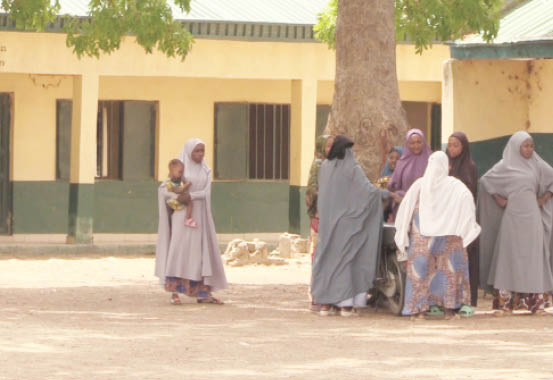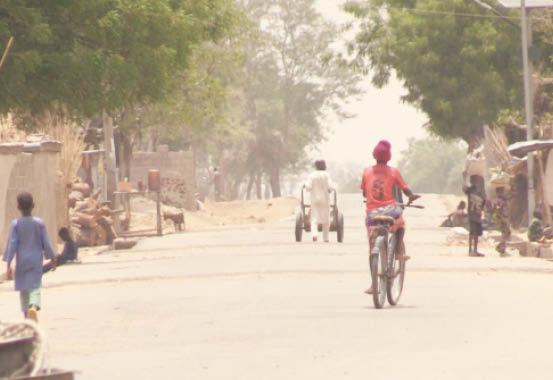Kano community where girls don’t go beyond secondary school
Over the years, girl-child education has been described as one of the most important aspect of societal development, with many non-governmental organisations at home and abroad working to encourage it with huge investments. But unfortunately, in some parts of northern Nigeria, girl-child education is still facing several barriers, relating mostly to religion, culture and traditional […]

Over the years, girl-child education has been described as one of the most important aspect of societal development, with many non-governmental organisations at home and abroad working to encourage it with huge investments. But unfortunately, in some parts of northern Nigeria, girl-child education is still facing several barriers, relating mostly to religion, culture and traditional beliefs.
At a community in Warawa Local Government Area of Kano State, our correspondent learnt that girls hardly go beyond secondary school because they would find it very difficult to marry as their men don’t usually go for those who go beyond that level.
Men in Jemagu believe that girls who go beyond secondary school would have experienced some social life that would make them very difficult to control. Residents said their children’s education, especially the girls, began and ended in Jemagu primary and secondary schools.
Babangida Adamu is among the men in Jemagu who believe that it is not proper to marry a girl who has gone beyond secondary school. He added that girls who acquire higher education would not like to marry men who have no formal education.
- Onion scarcity looms as demand exceeds production in Kano
- Concerns over clumsy record keeping in Nigerian universities
“The truth is that any woman who acquired higher education would not like to marry a man with lower education. I will also not marry a girl who has university degree because I do not have a degree. This is why most men will not like to marry girls with higher education,” Adamu said.

A 25-year-old Khadija Muhammad Jemagu, who recently obtained a diploma in Marketing from the Kano State Polytechnic but does not have government job or husband, said she had resorted to helping a non-governmental organisation to promote girl-child education in her community. She believes there is the need to intensify awareness among parents on the importance of girl-child education.
According to Khadija, many people have told her that since she has chosen western education, it would be difficult for any man in her village to come close to her because the men believe that she is wiser than any man that may be willing to marry her since most of them do not have more than secondary education.
“Even before I finished my diploma, many people would go about saying that since my father had chosen to send us to school, they would see who would come and marry us. And for several years I have been living like this because in this our village, no man has ever come to me with marriage proposal, simply because I have a diploma,” she said.
But despite this belief in Jemagu, some girls like Hussaina Muhammad are still trying to obtain a certificate on education, but there is no man within the community willing to marry her at the moment. She, however, insists that her educational ambition is a priority.
But Hussaina believes she can still get a husband within or outside her community provided she becomes well educated. She vowed that insult and discrimination from men within her village would not discourage her ambition.
“After secondary school, I started my National Certificate in Education (NCE) programme here in Warawa, but you know the belief our people. They see us as prostitutes; therefore, no one will come to offer his hand in marriage to us. But I will not be discouraged because I believe that whenever it is time for me to marry, God will definitely bring a husband for me,” she said.
Zainab Makera was able to get married after secondary school. She wants to proceed but is faced with a difficult choice – to further her education or stay with her husband. She said she had been trying to convince her husband to allow her continue but she was told that if she really wanted to continue with her education, she had to get divorced.
Meanwhile, few women who were able to convince their husbands to allow them proceed beyond secondary school “are constantly being rejected by community members,” said Hussaina.
According to education authorities in Warawa Local Government, this belief is not the only problem affecting girl-child education in Jemagu.
Lack of commitment by parents, especially mothers, may have worsened the situation over the years.
“There are several reasons why girls don’t go to school frequently; few of them have to do with the attitude of their parents, especially women who often sent their female children for hawking and other domestic works that stop them from attending classes,” said Munnir Muhammad, an education secretary in Warawa.
On the issue of girls not being able to get husbands after attending higher institution at Jemagu, Munnir believes that the problem is not only in Jemagu or Warawa Local Government.
“It is a general societal problem in northern Nigeria, where men, especially those with formal education usually reject women with higher education. Additionally, the government is working with parents-teachers associations, mothers associations and other relevant stakeholders to improve girl-child education in Warawa Local Government.”
Meanwhile, residents said apart from poverty among the local community, lack of awareness by government authorities and poor education infrastructure, the problem of water supply in Jemagu village is forcing many children, especially girls, to skip school because they have to travel long distance to fetch water for the house. But government authorities assured that the problem of water supply in this village would soon be a thing of the past.
While recognising the threat of rejecting girls beyond secondary school as a major problem affecting girl-child education in the area, the caretaker chairman of Warawa Local Government, Lamido Sanusi, acknowledged that the problem of water is another major issue at Jemagu village. He said their ambition was to ensure that every girl-child is educated from primary school to university level without any form of discrimination across all villages and towns of Warawa Local Government.
Daily Trust on Sunday reports that the trauma of not being able to get husbands after higher education has continued to discourage many parents in Jemagu from sending their girls to school, most especially as their boys hardly go beyond secondary school.
